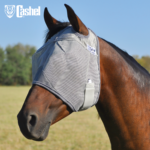
Digestive enzymes are proven to help dogs, cats and people with problems with their pancreas, the organ that secretes digestive enzymes into the intestine. Horses don’t have pancreatic problems, so we may find that digestive enzymes aren’t necessary. Horses are designed to eat grass and have a limited ability to digest the grains and fats we often feed them. A horse is designed to use fiber as a major source of calories, and this has to be broken down by beneficial organisms (bacteria and protozoa) in the large intestine. Horses can have inefficient fermentation of fiber as a result of poor populations of organisms in the large intestine, making many people assume digestive enzymes are a logical addition to a horse’s feed. They may be.
Where They Help
Although specific equine research is lacking, evidence from studies with other species suggests that digestive enzymes may help some horses. However, if your horse is a healthy weight and has no digestive-tract problems, he doesn’t need supplemental enzymes, and interfering with his healthy digestive tract may backfire on you.
Situations where digestive enzymes may help include:
Older horses having trouble holding their weight despite actually eating more than they did when younger.
- Active horses that cannot hold their weight on hay alone but have digestive upsets (e.g., diarrhea) when fed grain.
- Horses prone to bloating, manure changes or gas colic.
It’s important to remember that problems are best treated by getting to the root of the cause, which may have nothing to do with digestive enzymes.
Enzyme Tips
- Skip digestive enzymes if your horse is a healthy weight and has no digestive-tract problems.
- Evaluate the horse’s overall diet and make necessary changes, as grain and fat aren’t natural feeds for horses.
- Consider the root cause of a horse’s problem before tossing in digestive enzymes.
- Look for products with a guaranteed level of activity.
Buyer’s Guide
Our action plan on page 64 will help you know in what direction to head to help your horse. There are several categories of terms that you’ll encounter.
Prebiotics are anything that encourages the growth of beneficial organisms but don’t actually contain live organisms.
Probiotics contains live organisms.
Digestive enzymes are neither prebiotics nor probiotics. They are enzymes that work directly to help break down a food component.
Since there are no regulations on how much actual enzyme activity a product must have before it can be labeled or advertised as a “feed enzyme,” you’re at the mercy of the manufacturers.
The type of enzymatic ingredients in a product will determine which feed components it may help digest.
Protein: Trypsin, chymotrypsin, bromelain, papain, pepsin
Fat: Lipase
Starch: Amylase
Sugars: Lactase, sucrase
Fiber: Cellulase, xylanase, hemi-cellulase, beta-glucanase
Probiotic-type products that contain fungal or bacterial fermentation products will always have some low level of enzyme activity and are often advertised as feed enzymes. But they may contain only about 5% active enzymes, versus 100% enzyme activity for a purified enzyme product. These products can still work well because they contain probiotic organisms that do the work of digesting fiber and growth factors to help these organisms multiply. However, for heavy-duty enzyme activity, you need either pure enzymes or high guaranteed levels of enzyme activity.

Bottom Line
The effectiveness and correct dosing for digestive enzymes in horses is unknown. We’d avoid using them in a healthy horse. If your horse has digestive or weight problems, explore other options first to determine the cause.
If you try digestive enzymes, stick with products that focus on protein- and cellulose-digesting enzymes and stay within the suggested dosages. Don’t waste your money on products that contain high lipase. These are more appropriate for a human or pet because their diets are much higher in fat than a horse’s. Amylase is only likely to help if the horse is getting grain. Protein-digesting enzymes and cellulose/xylanase are the primary ingredients likely to help a horse. Look for higher levels of these than amylase or lipase.
Overdoses can cause stomach irritation and even ulcerations in the intestines, and this is particularly a concern since we don’t know safe or optimal dosages for equine digestive tracts. Stick to manufacturers’ recommendations for use in horses, and be alert for any worsening of symptoms or new intestinal symptoms. If these occur, stop feeding the enzymes immediately and let the product manufacturer know.
If you don’t see an obvious improvement after a month, stop using the product and talk with your vet.





